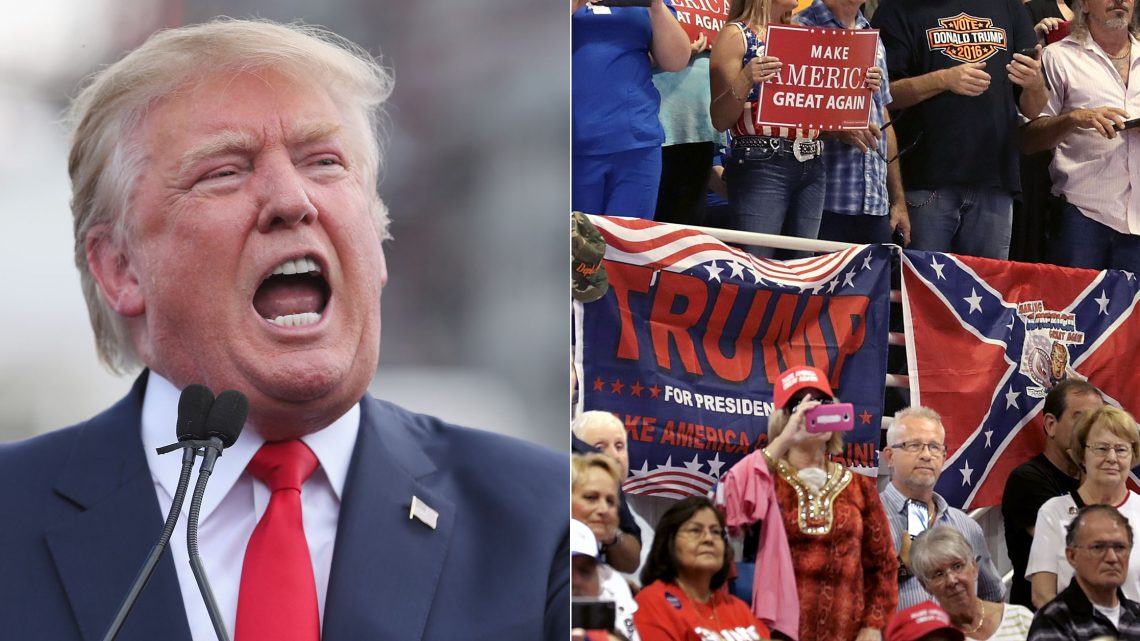
It’s Become Impossible for Republicans to Deny Their Party Is Racist
June 14, 2018When Corey Stewart won the Virginia Republican Senate primary on Tuesday, the reaction from some corners of the GOP was shock and dismay that the party had nominated a overt white nationalist for such an important post. Last year Stewart ran for governor as a proud and vociferous defender of the Confederacy (despite being from Minnesota); during the campaign he refused to condemn the racists at the "Unite the Right" in Charlottesville and claimed that “half of that violence was committed by left-wingers.” He also expressed admiration for anti-Semitic Wisconsin fringe Republican Paul Nehlen and made no secret of his anti-immigrant ideology.
Despite all that, he very nearly upset Ed Gillespie in last year’s gubernatorial primary. That makes his victory in the Senate race not a total surprise, but it has apparently roiled the Republican establishment.
“This is clearly not the Republican Party I once knew, loved and proudly served," said former GOP Virginia Lieutenant Governor Bill Bolling in a tweet. "Longtime major GOP donors and campaign workers in [Virginia] have told me last night and today that with Corey Stewart’s nomination, they are ‘done’ with the party," tweeted University of Virginia Center for Politics Director Larry Sabato, adding: "Last straw, they say."
Stewart does have one important ally, however: Donald Trump endorsed him shortly after his win. (Stewart was the chair of Trump's Virginia campaign until he was fired for supporting a protest against the Republican National Committee.) That makes him much harder to ignore than other, fringier candidates on the hard right, like proud Nazi Arthur Jones, who won a Chicago-area Republican primary in a safely Democratic district, or Nehlen, an open anti-Semite running to replace Paul Ryan in Wisconsin.
Bolling did not return a request for comment to clarify his views on what his party represented before Stewart's victory, nor did the Republican National Committee respond to request for comment on the party's allegedly changing ideology. But if Trump’s backing of Stewart represents an alliance between Republican leaders and the extremes of the right wing, that alliance is hardly new—though perhaps it is more open today.
The practitioners of Trumpist politics have framed themselves as populists who are breaking the mold. In a statement provided to me, Stewart embraced the populism of Trump and centered his campaign in opposition to elites across the political spectrum.
"Trump's win in 2016 and my performance these last two years in Virginia proves that instead of the Democrat Party representing the working class, the Republican Party is rejecting the Corporate Cronyism of the Rockefellers and the Clintons in favor of a more just, more fair, more equitable approach to government," Stewart's statement read. "One that doesn't play favorites to corporate paymasters, but that instead elevates America's core promise—equality of opportunity."
But what stood out for most observers weren’t Stewart’s views on class but his hard-right views on race—and how happy Republican voters were to support him despite his record of fringe, racist beliefs and his being a lightning rod for controversy.
"Stewart's neo-Confederate sympathies and his support for white supremacists, including those behind the 'Unite the Right' rally, apparently aren’t disqualifying," Princeton history professor Kevin Kruse said in an email. "Stewart is—perhaps with the exception of Trump himself—the highest level nominee with such views."
The racist rot of the Republican Party is not a new phenomenon. Steve King has been a GOP congressman for 15 years, and on Tuesday he promoted an actual neo-Nazi on Twitter. King's office told me that they had no comment on the tweet, which is still up on King's Twitter page as of this writing.
So far, no Republican Congressional leaders have condemned King for his tweet. And the last time he made statements about immigration and white birth rates, he told the Hill that his colleagues were "patting me on the back" for the comments. It's a claim that's become less outlandish with time.
The GOP's 20th-century lurch from a pro-business and moderately pro-integration party to the party of racial resentment is well documented. The change came about after the Democrats claimed the mantle of civil rights in the Lyndon Johnson era, leaving an opening in the formerly segregationist South for the Republican Party. It was an opening that was quickly and slyly exploited by the GOP.
Richard Nixon's 1968 campaign used code words and phrases like "law and order" and "the silent majority" to refer to the policing of communities of color and the white anti-integration movement respectively (terms that Trump resurrected in 2016). Ronald Reagan, the saint of the modern Republican Party, perpetuated the racist myth of the "welfare queen" and first coined the future Trump campaign phrase, "Make America Great Again." George H.W. Bush ran on the Willie Horton ad and his son didn't care about black people.
The shift in rhetoric was explained in surprisingly stark terms by famed Republican strategist Lee Atwater in an infamous 1981 interview:
You start out in 1954 by saying, "Nigger, nigger, nigger." By 1968 you can't say "nigger" — that hurts you. Backfires. So you say stuff like forced busing, states' rights and all that stuff. You're getting so abstract now [that] you're talking about cutting taxes, and all these things you're talking about are totally economic things and a byproduct of them is [that] blacks get hurt worse than whites. And subconsciously maybe that is part of it. I'm not saying that. But I'm saying that if it is getting that abstract, and that coded, that we are doing away with the racial problem one way or the other. You follow me — because obviously sitting around saying, "We want to cut this," is much more abstract than even the busing thing, and a hell of a lot more abstract than "Nigger, nigger."
Yet despite the fact that the contents of the above clip have been public since 1984, and even though the GOP has been running on white racial resentment for half a century, the current direction of the party still has many saying they're confused and disappointed.
"I don't know what the hell happened," said former RNC Chair Michael Steele of the GOP's tilt to the extremes of the racist right in January.
It is true that saying the quiet part loud is a new phenomenon. Pre-Trump, the GOP apparently assumed it would have to govern with at least the consent and hopefully the support of a demographically and socially changing country, and was following Atwater’s strategy of making the dog whistles more and more obscure.
That abstraction allowed voters who may not necessarily subscribe to the more extreme racialized edges of the American conservative movement to rationalize voting for politicians that might, under other circumstances, be unacceptable to anyone other than a small minority of reactionaries. The rise of Trump and others in his orbit is making that rationalization more difficult, even for those who could ignore the racism of previous GOP presidents and parties.
Stewart's primary win was another crack in the facade that there was a meaningful separation between the hard right wing and the mainstream Republican Party. Individual Republicans may not like it, but they couldn’t stop Trump from winning the nomination in 2016 and couldn’t stop Stewart either.
"We’ve been close to here before, when Klan leader David Duke won the Republican nomination for Louisiana governor in 1991, but back then President George H.W. Bush pointedly disavowed Duke," said Kruse. "Trump has signaled that Stewart, in contrast, is welcome in the party."
Sign up for our newsletter to get the best of VICE delivered to your inbox daily.
Follow Eoin Higgins on Twitter.


